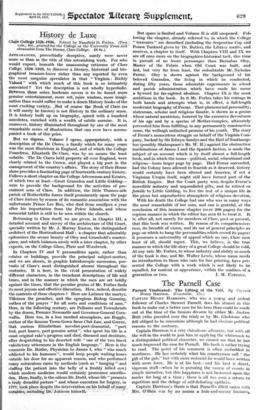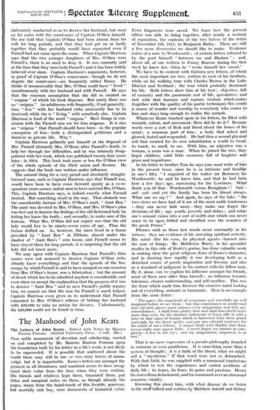The Parnell Case
Parnell Vindicated : The Lifting of the Veil. By Captain- Henry Harrison. (Constable. 17s.)
CAPTAIN HENRY HARRISON, who was a young and ardent follower of Charles Stewart Parnell, does his utmost in this book to make out a better case for his hero, than could be made out at the time of the fambus divorce by either Mr. Justice Butt (who presided over the trial) or by Mr. Gladstone who felt obliged to be censorious although he had obvious political
reasons to the contrary. -
Captain Harrison is a very chivalrous advocate, but with all the will in the world to join him in applying the whitewash to a distinguished political character, we cannot see that he has much improved the case for Parnell. His book is rather trying to read. The point of his comment is often embedded in
wordiness. He has certainly what his countrymen the gift of the gab," but with more restraint he would have written with more force. He is at his best—and his best is direct, vigorous stuff—when he is pursuing the course of events in simple narrative; but this happiness is not bestowed upon the reader for long at a time ; there is all too soon a return to repetition and the deluge of self-defeating epithets.
Captain Harrison's thesis is that Parnell's illicit union with Pam. O'Shea was by no means a hole-and-corner busineisl elaborately conducted so as to deceive her husband, but went on for years with the connivance of Captain O'Shea himself. We are told that Captain O'Shea had been absent from his wife for long periods, and that they had got on so badly together that they probably would have separated even if Parnell had not come upon the scene. When Captain Harrison says that the two younger daughters of Mrs. O'Shea were Parnell's, there is no need to deny it. It was currently said at the time that they were both Parnell's and it has been widely believed ever since. Captain Harrison's arguments, however, in proof of Captain O'Shea's connivance—though we do not dispute the connivance—are.-frequently. rather flimsy. He thinks it inconceivable that Mrs. O'Shea could have " lived " simultaneously with her husband and with Parnell. He says that the common assumption that, she did so created an " enigma " of which his book disposes. But surely there was no " enigma." An adulterous wife frequently, if not generally, does " live '! with her husband (who necessarily has to be deceived) while she is " living " with somebody else. Captain Harrison is fond of the word " enigma." Most things in con- nexion with the Parnell case are for him enigmas. It is also an " enigma " that Parnell should have been—in the popular conception of him—both a distinguished politician and a deceiver in private life. Why ?
Captain Harrison gallantly put himself at the disposal of Mrs. Parnell (formerly Mrs. O'Shea) after Parnell's death, to help her through her difficulties, and he was intensely disap- painted with her book, which was published twenty-four years later—in 1914. This book took more or less the O'Shea view of' the whole episode of the, illicit union and divorce. He suggests that the book was written under influence.
The natural thing for a very- proud and absolutely straight- ' forward man, such as Captain Harrison says that Parnell was, would have been to have come forward openly as a co-re- spondent years sooner, and at once to have married Mrs. O'Shea. This, Captain Harrison says, • is indeed •exactly what Parnell desired. But something stood in the way. That obstacle was the considerable fortune of Mrs. O'Shea's aunt, " Aunt Ben." The aunt was devoted to Mrs. O'Shea, and Mrs. O'Shea's plan was first not to harrow the feelings of the old-fashioned lady by letting her know the truth ; and secondly, to make sure of the fortune. What Mrs. O'Shea did' not expect was that the old lady would live to be ninety-seven years of age. Thus the liaison drifted on. As, however, the niece lived in a house provided by "Aunt Ben " at Eltham, almost under the shadow of " Aunt Ben's " own house, and Parnell seems to have stayed there for long periods, it is surprising that the old lady did not know more.
We may agree with Captain Ha rrison that Parnell's false names were not assumed to deceive Captain O'Shea (who already knew everything) and that the episode of the fire- escape, by which Parnell is said to have escaped on one occasion from Mrs. O'Shea's house, was a fabrication ; but the amount of deceit which has to be admitted anyhow is considerable, and even when we accept the explanation that the purpose of it was to deceive " Aunt Ben " and to save Parnell's public reputa- tion, we cannot sec that the case for Parnell is much helped. Captain Harrison even gives us to understand that Parnell consented to Mrs. O'Shea's scheme of bribing her husband with £20,000 to take no action for divorce. Unfortunately, the £20,000 could not be found in time.















































 Previous page
Previous page